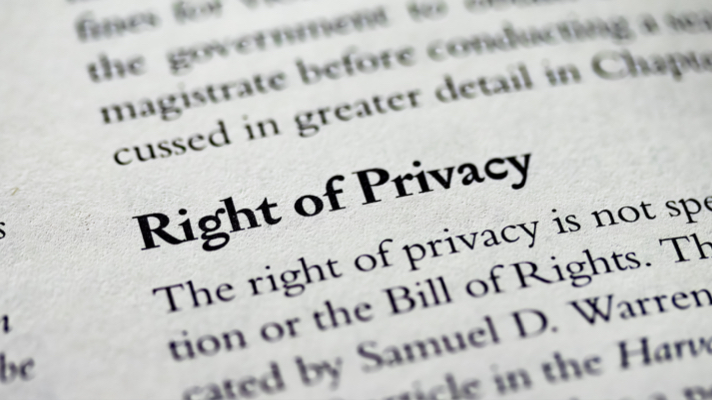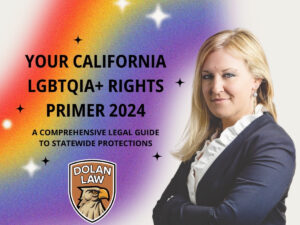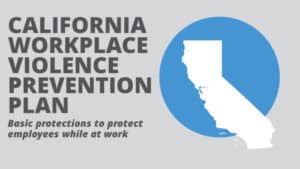Written By: Chris Dolan and Vanessa Deniston
This week’s question comes from Justin in San Leandro, CA, who asks: I work at a high-security facility monitored in various locations by video cameras. As a requirement part of the hiring process, I was required to undergo a background check and provide personal information I felt was overly invasive and not pertinent to my position. I also received a notice shortly after I began work that, as a matter of policy, my employer had the right to examine all communications sent to or from my email account and personal phone during work hours. Do you have any privacy rights at work?
Dear Justin,
We have all felt that unsettling feeling of being overly observed. While an employee relinquishes several privacy rights during the employment hiring process and upon entering a workplace environment, accepting a job does not equate to a wholesale forfeiture of your privacy rights, far from it.
Common Privacy Issues Arising in the Hiring Process
Background Checks
Many California employers utilize background checks in their hiring process. These background checks are typically customized depending on the information sought. Still, most employers seek to discover any concerning criminal history, past employment verification, and confirmation of education and/or credentials. However, some important limitations exist on how and when employers can run background checks on applicants.
California’s Fair Chance Act was passed into law in 2018 and codified in Cal. Gov. Code §12952 represents the country’s most restrictive criminal background check law. Under the Fair Chance Act, California employers can engage in a criminal background check for most positions only after the employer makes an initial offer of employment to the employee. Once an offer has been made, an employer cannot withdraw the offer due to information gleaned in a criminal background check until the employer conducts an individualized assessment, considering the nature of the offense and duties of the job applied for. Should an employer still decide to withdraw the offer, the employer must explain in writing the reason for rescinding, provide a copy of the background check, and give the potential employee five days to respond.
Collection of Personal Information in an Interview or Application
During the interview, an applicant can learn much about how a potential employer will treat their privacy through the employment relationship. Non-job-related questions seeking personal details about a candidate’s personal life are typically forbidden, for instance, inquiring about someone’s citizenship or immigration status, marital status, physical or mental health, religious affiliation, or when a candidate graduated from high school or college. While questions like, “So, where are you originally from?” or “We have a big work Christmas party every December. What holidays do you celebrate?” may appear at first blush harmless small talk, California prohibits questions seeking to learn information that can lead to discriminatory hiring practices, based on a candidate’s protected class set out in the California Fair Employment and Housing Act.
Common Privacy Issues Within the Work Environment
Privacy Around the Office
Once an employee enters the work environment, the key inquiry is where, when, and in what context does an employee have a reasonable expectation of privacy? Generally, California courts have held employees do not have a reasonable expectation of privacy in common areas or walkways in the workplace. But what about taking a non-work phone call behind a closed office door or sending a personal email from a work computer? While many factors go into determining whether an employee has a reasonable expectation of privacy, generally, an employer can monitor workplace communications, including business phone calls, emails, voicemail, and instant message chats on a company computer.
Audio Recordings and Personal Phone Calls
California is a two-party state with respect to audio recordings of confidential conversations. In effect, this means employers cannot record confidential conversations without the express consent of all parties to the conversation. Indeed, California Penal Code 632 makes such unauthorized recordings a criminal offense. Employers can and often do navigate these restrictions by obtaining their employees’ written or verbal consent. Often, this comes in the form of written “acknowledgment” by the employee during their onboarding process of the employee’s agreement to a company HR policy permitting the employer to audio record conversations. When it comes to personal calls, employers are prohibited from monitoring them unless employees make them from business phones after being told not to.
Video Surveillance
Video recordings of workers in California are generally allowed if they occur in a “public” area and if all video monitoring is disclosed to employees. According to the California Labor Code § 435, an employer cannot audio or video record any employee in a restroom, locker room, or room designated for changing clothes. Again, each circumstance is unique, and many factors are considered with respect to areas and conditions under which an employee has a reasonable expectation of privacy.
Monitoring Activity on Company Computers
According to the Electronic Communications Privacy Act (ECPA), a federal law passed in 1986, an employer-provided computer system is the employer’s property. This means an employee waives their reasonable expectation of privacy when using a work computer. Thus, an employer can monitor everything on that computer, including emails, downloads, internet browsing, etc. This is especially true if an employer states in their policies that electronic communications are to be used strictly for work-related matters and that the employer reserves the right to monitor or access all employee Internet or e-mail usage. Most employers provide a similar version of this policy in their employee handbook, which requires the employee to sign. Most Courts have found that just by providing this signature, an employee waives their expectation of workplace privacy.
Common Privacy Issues in the Virtual Space
Social Media
A word to the wise: social media accounts that are publicly available are available for your employer or potential employer to comb through. Employers can and often do look up prospective and current employees’ social media accounts. Publicly posting any content to your page or your account is discoverable information. While an employer cannot discriminate or retaliate against you for posting about issues protected by law, for instance, workplace conditions or pay, you should always consider how an employer or prospective employer may view the information.
With that said, an employer cannot demand that you accept a friend request or hand over your private username and password unless a case of harassment, misconduct, or a violation of company policy or applicable law arises. If you have marked your account “private,” this affords at least some privacy, but understand an employer can always attempt to view the information through one of your followers. As California is an at-will state, we cannot understate the importance of exercising caution in posting online content.
If you believe your employer is unreasonably interfering with your right to privacy or is retaliating against you in connection with an invasion of privacy, contact an attorney like the Dolan Law Firm to discuss the circumstances and better understand your rights.
***
Christopher B. Dolan is the owner of the Dolan Law Firm. Vanessa Deniston is a senior associate attorney in our Oakland, CA, office. We serve San Francisco Bay Area and California clients from our San Francisco, Oakland, and Los Angeles offices. Email any questions and topics for future articles to help@dolanlawfirm.com. Each situation is different, and this column does not constitute legal advice. We recommend consulting with an experienced trial attorney to understand your rights fully.










